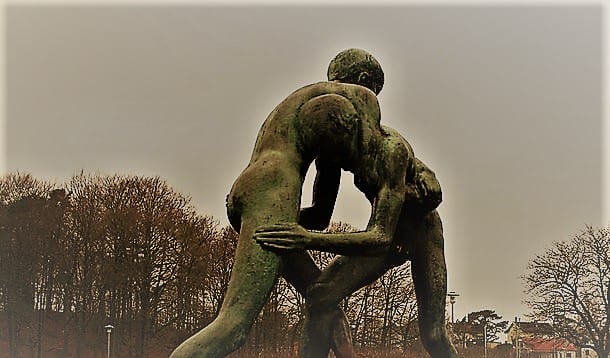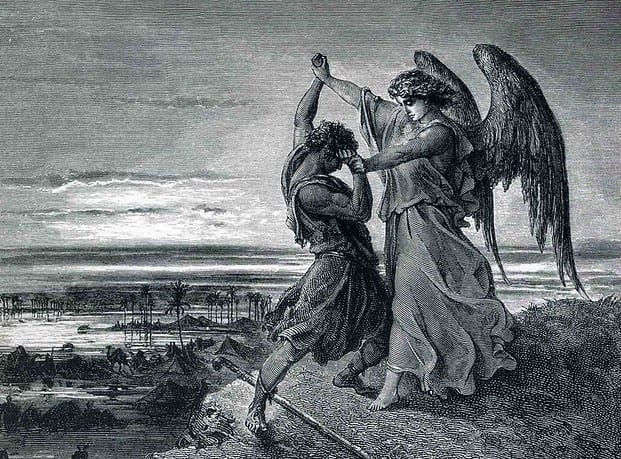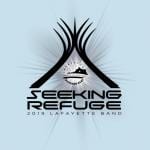Jacob wrestling with the mysterious stranger at the river Jabbok is one of my favorite stories from the Bible. One of the reasons it’s always resonated with me is because my maiden name is Jacobs, so I always felt an affinity for the character of Jacob. This passage about the wrestling match has been important for me because there have been times in my life when I’ve felt like I’ve been wrestling with myself, or my past, or even with God.
Maybe you’ve experienced that kind of wrestling, too.

I liked this passage so much, in fact, that I wrote paper on it for my Old Testament class in seminary many years ago. In my research, I examined the original Hebrew text and found some interesting things about puns and word plays used in the passage.
But before I get into that, let me give you the backstory leading up to Jacob at the Jabbok.
If you’ll recall, Jacob is a man of cunning and trickery.
From the moment he emerges from the womb, grabbing the heel of his twin brother, Esau, Jacob seeks to gain the upper hand in life through underhanded means. Using dirty tricks, he went after his brother’s birthright and the blessing from his father that should have been for Esau. So he has to flee from his home to escape the murderous anger of Esau.
At a place called Bethel, he finds himself alone in the desert and dreams of a ladder reaching to heaven. In the dream, God promises to be with him no matter what. God also promises to eventually bring him back to his homeland.
Jacob goes onto the country of his Uncle Laban where he marries his daughters, Leah and Rachel. [See the personal connection here? Leah married Jacob — Leah Jacobs. Also, my husband and I named our daughter Rachel. Biblical names and sagas are apparently a thing in our families.] Jacob acquires great wealth while working for his uncle. Then, true to the promise, God tells him to return to his home country. Jacob sends word to his brother that he wants to come home. His messengers return with the news that Esau is coming to meet him – with 400 men! Jacob is understandably afraid for his life and that of his family after what he did to Esau.
So Jacob resorts to his old tricks when preparing to meet his brother.
He divides his entourage in two and keeps one group back to protect at least half his property from his brother, whom he fears might seek revenge. Then he sent gifts of flocks ahead as a buffer between him and Esau.
Now here’s where we get to the interesting puns. There are three of them.
The first pun is Jabbok/Jacob.
Jabbok is the name of the river he is about to cross in order to meet Esau. The Hebrew verb y’baq means “to wrestle.” Both words are twists on the name “Jacob.” Jabbok is the river that borders the frontier to the land promised to Jacob and his ancestors — the land of Canaan. So the setting is crucial for the wrestling match.

When I researched this passage for my seminary paper, I learned that there is some debate among scholars about who it is that Jacob wrestles. Some say it is just a river demon. Others say it’s an angel sent by God to test Jacob. There is even the possibility that Jacob is wrestling with Esau, which would make sense – the two twins wrestling with each other, equal in strength.
Perhaps Jacob is actually wrestling with himself – his alter ego. The blow to the hollow of his thigh is a dirty trick – one that Jacob himself might use. And it would make sense as an origin story for the nation of Israel which has a history of wrestling with itself as well as with outsiders. The tribes of Israel often fought amongst themselves, to which Jacob’s internal battle may allude.
In any case, there is certainly deliberate ambiguity in the text.
But of all the possibilities as to who the stranger might be, I find one to be the most intriguing.
Jacob is wrestling with God.
At first, this doesn’t make sense. Why would God want to attack Jacob and wrestle with him? Well, if we look carefully, we find that this is exactly the encounter that Jacob is seeking.
Jacob deliberately sends his family and possessions across the river. It signifies that he is separate from “the tangible evidence of [his] blessing,” (Weis, 106). He is isolated from his identity which puts him in a state of vulnerability. It parallels his situation at Bethel, but this time he is choosing to be alone. He’s not running away; he’s going back. This shows that he is willing to face his past – as well as his destiny – without any help or protection.
Up until his wrestling match at the river Jabbok, Jacob’s methods of avoiding direct confrontation and outsmarting his opponents have been successful. He’s garnered women, children, and material wealth.
But here is what Jacob is about to find out: the very God who enabled Jacob to achieve such success requires more.
Let’s just pause here and think about the implications for our own lives, our own faith, our own church.
No matter where we have been, no matter our successes or sins, God does not abandon us. But there comes a time when God wrestles with us, and we wrestle with God, because something more is required of us. We come face to face with who we are – all our misdeeds, all our fears, the most vulnerable part of ourselves that we keep protected and hidden. And that’s where we meet God, often in a painful, and yet transformative way.
During that fateful night alone beside the river, Jacob finally faces the darkest parts of his personality and the sins of his past. More importantly, he confronts the future that God has destined for him. So this confrontation with God becomes the gift of grace that Jacob so desperately needs.
How does this grace come to Jacob? It comes in the form of a new name.
At dawn, after they have been wrestling all night, the mysterious man strikes Jacob in the groin. You can imagine the pain! Then the shadowy figure asks Jacob to release him. But Jacob will not let him go until he receives a blessing.
What does the mysterious figure do? He asks Jacob’s name. This is not just a random question. It was intended to remind Jacob of another time when Isaac, his father, asked his name. Jacob, the deceiver, had lied and said he was Esau so that he could receive his father’s blessing.

But here at the river Jabbok, Jacob admits who he really is – all his sins, all his arrogance, all his deception. This shows that he is repenting, making a decision to turn from his deceptive ways. (Homgren, p. 9).
So the mysterious stranger gives Jacob a new name – Israel. This is the second pun.
The Hebrew word is yisre’eli, which has several meanings:
“May God contend,” “May God rule,” and “Persevere.”
This name is appropriate in several ways. Jacob persevered with humans and prevailed. He persevered with God and received a blessing. Even with that very painful injury, he would not let go without wrestling a blessing from God. This name has significance for the Jewish people, for history has shown that just as their forefather persevered with humans and with God, the Chosen People have done the same.
This brings us to the third pun, which is on the name Jacob gives that place by the river — Penuel.
The Hebrew root is panim, meaning “face”. This works on three levels. First, Jacob is coming face-to-face with his brother Esau. Second, he is coming face-to-face with the sins of his past. Third, and most importantly, he is coming face-to-face with God. He is finally being honest. He is willing to be transformed.
So God responds by giving Jacob a blessing – not one stolen from his older brother, but a genuine blessing.
And yet, this blessing does not come without pain. Jacob sustains an injury to his groin – the most vulnerable part of his body – which will have long-lasting effects. Remember, Jacob struck others where they were most vulnerable. Now God has struck him in his most vulnerable spot.
From now on, Jacob will walk with a limp, signifying that he can no longer stride with arrogance, but must take his steps with humility. It also means that his time of fathering children is coming to an end. He is only able to have one more child after this – his last son, Benjamin [which happens to be my son’s name!].
The injury is a visible reminder to all who see Jacob/Israel that he is a man who finally submitted to God. “May God rule.”
Of course, as is often the case after an epiphany, the change is not fully realized right away. Remnants of the person’s old ways remain. Jacob is still not completely mature. Only in the ensuing years will Jacob grow into his new identity as a man of God. But there are several lessons we can draw from this story. And depending on where you are in your life and where you are in your faith journey, you may find one of these lessons resonates for you.
Lesson #1: Perseverance can lead to blessing.
There will be many times when we face “demons” or mysterious forces whom we cannot see or identify. Fighting in the dark against an unknown adversary is a common experience. Yet time and again, we somehow survive the battles and look back in awe at the blessing that came out of it. Remember, at the very moment when Jacob was at his most vulnerable and enduring the worst pain, a new day dawned.
Lesson #2: Blessing can emerge from pain.
Many people suffer physical, mental and spiritual woundedness. Perhaps you bear the scars of life’s “wrestling matches.” Sometimes there is a tendency to misdirect the anger, pain, and negative feelings in ways that hurt others or ourselves. But it is actually God whom you should confront when you are in pain. Only God can truly handle our woundedness and transform it into something useful and meaningful. Jacob was willing to learn what God might do with a person who is lame. To learn that is one of the greatest lesson for a human soul. Whatever your pain is, wherever your wound lies, wrestle with God about it and don’t let go until you get a blessing out of it.
And finally . . .
Lesson #3: Don’t be afraid to come to Penuel, “face-to-face.”

What is it, or who is it, that you have been avoiding? As we see from Jacob’s history, using questionable means to attain what we want and avoiding direct confrontation with someone or with God can mean not only risking what you already have, but can stunt your spiritual growth.
This applies not just to individuals, but to faith communities as well. Especially as a church, we can be encouraged by this text to grapple with our differences, our difficult histories, and the ways we have failed in the past. We can wrestle with injustice, contend with the forces that keep us from being all that God calls us to be. Because when we do this, we will be spiritually alive and find ourselves encountering God. (Weis, p. 109.)
Coming to Penuel means coming face-to-face with yourself – being honest with yourself, others, and God. There was an honesty in Jacob’s struggle. And this is what God was looking for.
This honesty is what God wants from us, too. If you want to receive a blessing, you must be honest – especially with God! Shortcuts and tricks are not the way to receive God’s grace. And evading the consequences of our sin will only make the inevitable more painful.
God cannot be conquered; to think otherwise is a sin of extreme hubris or pride. Yet we are not to run away from meeting God face-to-face; this is a sin of cowardice. We are challenged to come down to the river Jabbok and wrestle for the blessing.
Yes, we may walk with a limp at the end of this struggle. But we will emerge transformed, changed by the blessing of God.
Come to Penuel. Because that is where we will encounter the transforming grace of God.
Sources:
Holmgren, Frederick C; “Holding Your Own Against God”; Interpretation, Vol. 44, January, 1990
Weis, Richard D.; “Lessons on Wrestling with the Unseen”; Reformed Review, Vol. 42, Winter 1988

Leah D. Schade is the Assistant Professor of Preaching and Worship at Lexington Theological Seminary in Kentucky. She is the author of Preaching in the Purple Zone: Ministry in the Red-Blue Divide (Rowman & Littlefield, 2019) and Creation-Crisis Preaching: Ecology, Theology, and the Pulpit (Chalice Press, 2015).
Twitter: @LeahSchade
Facebook: https://www.facebook.com/LeahDSchade/
Read also:
Prodigal Sisters, Prodigal God: The Surprise Party













